Natural resource management decisions in protected areas impact more than the wildlife and landscapes they’re charged to conserve. They also affect neighbors, who could otherwise hunt, build, or engage in recreation as they choose on their own land. For decades, community members primarily voiced their opinions through brief and impersonal public comment periods. But an initiative led by environmental social scientists at the University of Illinois Urbana-Champaign is putting a new spin on neighborly communication.
Natural resource management decisions in protected areas impact more than the wildlife and landscapes they’re charged to conserve. They also affect neighbors, who could otherwise hunt, build, or engage in recreation as they choose on their own land. For decades, community members primarily voiced their opinions through brief and impersonal public comment periods. But an initiative led by environmental social scientists at the University of Illinois Urbana-Champaign is putting a new spin on neighborly communication.
„Historically, public land management agencies would offer brief periods where people could submit a remark that may or may not be considered and that typically wouldn’t result in any meaningful dialogue,“ said Carena van Riper, associate professor in the Department of Natural Resources and Environmental Sciences in the College of Agricultural, Consumer and Environmental Sciences (ACES) at U. of I. „For more inclusive conservation to happen, there needs to be in-depth engagement, communication, and deliberation with diverse stakeholders. There’s real benefit to engaging people.“
Van Riper has been working toward a model of inclusive conservation for nearly a decade in the area surrounding Alaska’s Denali National Park, partnering with the National Park System (NPS) to examine the values and viewpoints of neighbors on everything from conservation priorities to tourism impacts. She and her colleagues have published results of their latest engagement efforts in Sustainability Science.
The study brought Denali neighbors together in a month-long online discussion forum designed to understand their views on the benefits and threats facing the area, as well as how land management agencies could better incorporate their perspectives.






